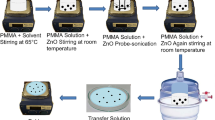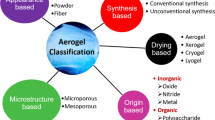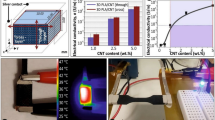Abstract
Carbon nanotubes (CNTs) have enormous application in various fields such as sensors, aerospace, super capacitors and photovoltaic devices, etc., and they are extensively exploited for number of other energy and environmental applications nowadays. With the rapid development and evolution in the field of aerospace industry, the existing developed technologies do not have adequate potential to overpower the requirements and demands of the new era. Nanocomposites based on CNT have procured significant attention in recent years for their applications in aircrafts, military crafts, missile and spacecraft due to advanced properties such as thermal stability, chemical stability, huge surface area, etc. In this review, the fundamentals in the field on CNT nanocomposites with reference to nanoparticles and conducting polymers such as DGEBA, polyaniline, polythiophene and polypyrrole are discussed. The main objective of the review is to study the advancement in aerospace applications of polymer/CNT nanocomposites.


Similar content being viewed by others
References
Bagchi A, Nomura S (2006) On the effective thermal conductivity of carbon nanotube reinforced polymer composites. Compos Sci Technol 66(11–12):1703–1712
Chang T-E et al (2006) Conductivity and mechanical properties of well-dispersed single-wall carbon nanotube/polystyrene composite. Polymer 47(22):7740–7746
Debelak B, Lafdi K (2007) Use of exfoliated graphite filler to enhance polymer physical properties. Carbon 45(9):1727–1734
Khelifa I et al (2019) New poly (o-phenylenediamine)/modified-clay nanocomposites: a study on spectral, thermal, morphological and electrochemical characteristics. J Mol Struct 1178:327–332
Rafique I et al (2016) Exploration of epoxy resins, hardening systems, and epoxy/carbon nanotube composite designed for high performance materials: a review. Polym Plast Technol Eng 55(3):312–333
Kausar A, Rafique I, Muhammad B (2016) Review of applications of polymer/carbon nanotubes and epoxy/CNT composites. Polym Plast Technol Eng 55(11):1167–1191
Schnorr JM, Swager TM (2010) Emerging applications of carbon nanotubes. Chem Mater 23(3):646–657
Saber Samandari S (2014) Elastic modulus measurement of polymer matrix nano-composites reinforced by platelet nano-clays. Int J Nano Dimens 5:273–278
Usuki A et al (1993) Swelling behavior of montmorillonite cation exchanged for ω-amino acids by∊-caprolactam. J Mater Res 8(5):1174–1178
Haque A et al (2002) s2-glass/vinyl ester polymer nanocomposites: manufacturing, structures, thermal and mechanical properties. In: 17th annual technical conference. American Society for Composites
Andrei G, Dima D, Andrei L (2006) Lightweight magnetic composites for aircraft applications. J Optoelectron Adv Mater 8(2):726
Cheung KC, Gershenfeld N (2013) Reversibly assembled cellular composite materials. Science 341:1240889
Bekyarova E et al (2007) Multiscale carbon nanotube–carbon fiber reinforcement for advanced epoxy composites. Langmuir 23(7):3970–3974
Koelle D (2003) Specific transportation costs to GEO—past, present and future. Acta Astronaut 53(4–10):797–803
Thostenson E et al (2002) Carbon nanotube/carbon fiber hybrid multiscale composites. J Appl Phys 91(9):6034–6037
Wu M et al (2000) Electromagnetic and microwave absorbing properties of iron fibre-epoxy resin composites. J Phys D Appl Phys 33(19):2398
Périchaud M-G et al (2000) Reliability evaluation of adhesive bonded SMT components in industrial applications. Microelectron Reliab 40(7):1227–1234
White KL, Sue HJ (2011) Electrical conductivity and fracture behavior of epoxy/polyamide-12/multiwalled carbon nanotube composites. Polym Eng Sci 51(11):2245–2253
Park SJ, Kim HC (2001) Thermal stability and toughening of epoxy resin with polysulfone resin. J Polym Sci Part B Polym Phys 39(1):121–128
Jin F-L, Ma C-J, Park S-J (2011) Thermal and mechanical interfacial properties of epoxy composites based on functionalized carbon nanotubes. Mater Sci Eng A 528(29–30):8517–8522
Bascom W et al (1975) The fracture of epoxy-and elastomer-modified epoxy polymers in bulk and as adhesives. J Appl Polym Sci 19(9):2545–2562
Na T et al (2013) Composite membranes based on fully sulfonated poly (aryl ether ketone)/epoxy resin/different curing agents for direct methanol fuel cells. J Power Sources 230:290–297
Jin F-L, Park S-J (2013) Recent advances in carbon-nanotube-based epoxy composites. Carbon Lett 14(1):1–13
Anilkumar KR et al (2009) Effect of molybdenum trioxide (MoO3) on the electrical conductivity of polyaniline. Phys B 404(12–13):1664–1667
Kryszewski M (1991) Heterogeneous conducting polymeric systems: dispersions, blends, crystalline conducting networks—an introductory presentation. Synth Met 45(3):289–296
Daikh S et al (2018) Chemical polymerization, characterization and electrochemical studies of PANI/ZnO doped with hydrochloric acid and/or zinc chloride: differences between the synthesized nanocomposites. J Phys Chem Solids 121:78–84
Le TH et al (2013) Electrosynthesis of polyaniline–mutilwalled carbon nanotube nanocomposite films in the presence of sodium dodecyl sulfate for glucose biosensing. Adv Nat Sci Nanosci Nanotechnol 4(2):025014
Molapo KM et al (2012) Electronics of conjugated polymers (I): polyaniline. Int J Electrochem Sci 7(12):11859–11875
Hassan M et al (2014) Hierarchical assembly of graphene/polyaniline nanostructures to synthesize free-standing supercapacitor electrode. Compos Sci Technol 98:1–8
Yamani K et al (2019) Preparation of polypyrrole (PPy)-derived polymer/ZrO2 nanocomposites. J Therm Anal Calorim 135(4):2089–2100
Proń A et al (1985) Mössbauer spectroscopy studies of selected conducting polypyrroles. J Chem Phys 83(11):5923–5927
Armes SP (1987) Optimum reaction conditions for the polymerization of pyrrole by iron (III) chloride in aqueous solution. Synth Met 20(3):365–371
Marks RS et al (2002) An innovative strategy for immobilization of receptor proteins on to an optical fiber by use of poly (pyrrole–biotin). Anal Bioanal Chem 374(6):1056–1063
Neoh K et al (1997) Oxidation–reduction interactions between electroactive polymer thin films and Au(III) ions in acid solutions. Chem Mater 9(12):2906–2912
Vernitskaya TYV, Efimov ON (1997) Polypyrrole: a conducting polymer; its synthesis, properties and applications. Russ Chem Rev 66(5):443–457
Kang E et al (1988) ESCA analysis of polymer–acceptor interactions in chemically synthesized polypyrrole–halogen complexes. Polym J 20(5):399
Rapi S, Bocchi V, Gardini GP (1988) Conducting polypyrrole by chemical synthesis in water. Synth Met 24(3):217–221
Yamaura M, Hagiwara T, Iwata K (1988) Enhancement of electrical conductivity of polypyrrole film by stretching: counter ion effect. Synth Met 26(3):209–224
Waugaman M et al (2003) Synthesis, characterization and biocompatibility studies of oligosiloxane modified polythiophenes. Eur Polym J 39(7):1405–1412
Georger JH et al (1987) Helical and tubular microstructures formed by polymerizable phosphatidylcholines. J Am Chem Soc 109(20):6169–6175
Shen Y, Wan M (1997) Soluble conductive polypyrrole synthesized by in situ doping with β-naphthalene sulphonic acid. J Polym Sci Part A Polym Chem 35(17):3689–3695
Li S et al (2010) Nanocomposites of polymer and inorganic nanoparticles for optical and magnetic applications. Nano Rev 1(1):5214
Jabeen S et al (2015) A review on polymeric nanocomposites of nanodiamond, carbon nanotube, and nanobifiller: structure, preparation and properties. Polym Plast Technol Eng 54(13):1379–1409
Sadhasivam T et al (2017) Dimensional effects of nanostructured Mg/MgH2 for hydrogen storage applications: a review. Renew Sustain Energy Rev 72:523–534
Bystrzejewski M et al (2010) Catalyst-free synthesis of onion-like carbon nanoparticles. New Carbon Mater 25(1):1–8
Iijima S (1991) Helical microtubules of graphitic carbon. Nature 354(6348):56
Köhler AR et al (2008) Studying the potential release of carbon nanotubes throughout the application life cycle. J Clean Prod 16(8–9):927–937
Hafner JH, Cheung CL, Lieber CM (1999) Growth of nanotubes for probe microscopy tips. Nature 398(6730):761
Moniruzzaman M, Winey KI (2006) Polymer nanocomposites containing carbon nanotubes. Macromolecules 39(16):5194–5205
Ibrahim KS (2013) Carbon nanotubes-properties and applications: a review. Carbon Lett 14(3):131–144
Dresselhaus MS, Dresselhaus G, Eklund PC (1996) Science of fullerenes and carbon nanotubes: their properties and applications. Elsevier, Amsterdam
Bachtold A et al (2001) Logic circuits with carbon nanotube transistors. Science 294(5545):1317–1320
Wunder S et al (2010) Kinetic analysis of catalytic reduction of 4-nitrophenol by metallic nanoparticles immobilized in spherical polyelectrolyte brushes. J Phys Chem C 114(19):8814–8820
Maier S et al (2003) Plasmonics—a route to nanoscale optical devices (advanced materials, 2001, 13, 1501). Adv Mater 15(7–8):562
Homola J, Yee SS, Gauglitz G (1999) Surface plasmon resonance sensors. Sens Actuators B Chem 54(1–2):3–15
Sun S et al (2000) Monodisperse FePt nanoparticles and ferromagnetic FePt nanocrystal superlattices. Science 287(5460):1989–1992
Zheng N, Fan J, Stucky GD (2006) One-step one-phase synthesis of monodisperse noble-metallic nanoparticles and their colloidal crystals. J Am Chem Soc 128(20):6550–6551
Wu W et al (2010) Core–shell hybrid nanogels for integration of optical temperature-sensing, targeted tumor cell imaging, and combined chemo-photothermal treatment. Biomaterials 31(29):7555–7566
Dreaden EC et al (2012) The golden age: gold nanoparticles for biomedicine. Chem Soc Rev 41(7):2740–2779
Schmid G (2005) Nanoparticles. Wiley, Hoboken
Kelly KL et al (2003) The optical properties of metal nanoparticles: the influence of size, shape, and dielectric environment. ACS Publications, Washington
Jacobson DM, Sangha SP (1998) Future trends in materials for lightweight microwave packaging. Microelectron Int 15(3):17–21
Śleziona J, Wieczorek J, Dyzia M (2006) Mechanical properties of silver matrix composites reinforced with ceramic particles. J Achiev Mater Manuf Eng 17(1–2):165–168
Broza G (2010) Synthesis, properties, functionalisation and applications of carbon nanotubes: a state of the art review. Chem Chem Technol 4(1):35–45
Cha SI et al (2005) Extraordinary strengthening effect of carbon nanotubes in metal-matrix nanocomposites processed by molecular-level mixing. Adv Mater 17(11):1377–1381
Kim KT et al (2008) The role of interfacial oxygen atoms in the enhanced mechanical properties of carbon-nanotube-reinforced metal matrix nanocomposites. Small 4(11):1936–1940
Dang TMD et al (2011) Synthesis and optical properties of copper nanoparticles prepared by a chemical reduction method. Adv Nat Sci Nanosci Nanotechnol 2(1):015009
Wen J et al (2011) Preparation of copper nanoparticles in a water/oleic acid mixed solvent via two-step reduction method. Colloids Surf A 373(1–3):29–35
Kim KT et al (2011) Influence of embedded-carbon nanotubes on the thermal properties of copper matrix nanocomposites processed by molecular-level mixing. Scr Mater 64(2):181–184
Salavati-Niasari M, Davar F (2009) Synthesis of copper and copper (I) oxide nanoparticles by thermal decomposition of a new precursor. Mater Lett 63(3–4):441–443
Charinpanitkul T et al (2009) Single-step synthesis of nanocomposite of copper and carbon nanoparticles using arc discharge in liquid nitrogen. Mater Chem Phys 116(1):125–128
Yu W et al (2009) Synthesis and characterization of monodispersed copper colloids in polar solvents. Nanoscale Res Lett 4(5):465
Cheng Z et al (2011) Facile fabrication of ultrasmall and uniform copper nanoparticles. Mater Lett 65(19–20):3005–3008
Solanki JN, Sengupta R, Murthy Z (2010) Synthesis of copper sulphide and copper nanoparticles with microemulsion method. Solid State Sci 12(9):1560–1566
Park BK et al (2007) Synthesis and size control of monodisperse copper nanoparticles by polyol method. J Colloid Interface Sci 311(2):417–424
Firmansyah DA et al (2009) Crystalline phase reduction of cuprous oxide (Cu2O) nanoparticles accompanied by a morphology change during ethanol-assisted spray pyrolysis. Langmuir 25(12):7063–7071
Blackford R (1998) Performance demands on aerospace paints relative to environmental legislation. Aircr Eng Aerosp Technol 70(6):451–455
Gangopadhyay R, De A (2000) Conducting polymer nanocomposites: a brief overview. Chem Mater 12(3):608–622
Ray SS, Bousmina M (2005) Biodegradable polymers and their layered silicate nanocomposites: in greening the 21st century materials world. Prog Mater Sci 50(8):962–1079
Pandey JK et al (2005) An overview on the degradability of polymer nanocomposites. Polym Degrad Stab 88(2):234–250
Choa Y-H et al (2003) Preparation and characterization of metal/ceramic nanoporous nanocomposite powders. J Magn Magn Mater 266(1–2):12–19
Alexandre M, Dubois P (2000) Polymer-layered silicate nanocomposites: preparation, properties and uses of a new class of materials. Mater Sci Eng R Rep 28(1–2):1–63
Hussain F et al (2006) Polymer-matrix nanocomposites, processing, manufacturing, and application: an overview. J Compos Mater 40(17):1511–1575
Choi S-M, Awaji H (2005) Nanocomposites—a new material design concept. Sci Technol Adv Mater 6(1):2
Andrews R, Weisenberger M (2004) Carbon nanotube polymer composites. Curr Opin Solid State Mater Sci 8(1):31–37
Fischer H (2003) Polymer nanocomposites: from fundamental research to specific applications. Mater Sci Eng C 23(6–8):763–772
Thompson CM et al (2003) Preparation and characterization of metal oxide/polyimide nanocomposites. Compos Sci Technol 63(11):1591–1598
Meda L et al (2005) Nano-composites for rocket solid propellants. Compos Sci Technol 65(5):769–773
Nalwa HS (2000) Handbook of advanced electronic and photonic materials and devices, vol 1. Academic Press, Cambridge
Dresselhaus MS, Avouris P (2001) Introduction to carbon materials research. In: Avouris P (ed) Carbon nanotubes. Springer, pp 1–9
Meador M et al (2012) Nanotechnology roadmap technology area 10. National Aeronautics and Space Administration (NASA), Washington
Malsch I (2013) The just war theory and the ethical governance of research. Sci Eng Ethics 19(2):461–486
Lee T-W et al (2016) Electrically conductive and strong cellulose-based composite fibers reinforced with multiwalled carbon nanotube containing multiple hydrogen bonding moiety. Compos Sci Technol 123:57–64
Wong EW, Sheehan PE, Lieber CM (1997) Nanobeam mechanics: elasticity, strength, and toughness of nanorods and nanotubes. Science 277(5334):1971–1975
Gohardani AS, Doulgeris G, Singh R (2011) Challenges of future aircraft propulsion: a review of distributed propulsion technology and its potential application for the all electric commercial aircraft. Prog Aerosp Sci 47(5):369–391
Gohardani AS, Gohardani O (2012) Ceramic engine considerations for future aerospace propulsion. Aircr Eng Aerosp Technol 84(2):75–86
Gohardani AS (2013) A synergistic glance at the prospects of distributed propulsion technology and the electric aircraft concept for future unmanned air vehicles and commercial/military aviation. Prog Aerosp Sci 57:25–70
Baur J, Silverman E (2007) Challenges and opportunities in multifunctional nanocomposite structures for aerospace applications. MRS Bull 32(4):328–334
Allaoui A et al (2002) Mechanical and electrical properties of a MWNT/epoxy composite. Compos Sci Technol 62(15):1993–1998
Song PA et al (2008) Flame-retardant-wrapped carbon nanotubes for simultaneously improving the flame retardancy and mechanical properties of polypropylene. J Mater Chem 18(42):5083–5091
Xie X-L, Mai Y-W, Zhou X-P (2005) Dispersion and alignment of carbon nanotubes in polymer matrix: a review. Mater Sci Eng R Rep 49(4):89–112
O’Donnell SE (2003) Impact of nanomaterials in airframes on commercial aviation. In: AIAA third annual aviation technology, integration, and operations (ATIO) technology conference. The American Institute of Aeronautics and Astronautics, Denver, CO
Heimann M et al (2008) Investigations of carbon nanotubes epoxy composites for electronics packaging. In: Electronic components and technology conference, 2008. ECTC 2008. 58th. IEEE
Baughman RH, Zakhidov AA, De Heer WA (2002) Carbon nanotubes–the route toward applications. Science 297(5582):787–792
Cinausero N et al (2008) Fire retardancy of polymers: new strategies and mechanisms. Royal Society of Chemistry, London
Saito Y, Uemura S (2000) Field emission from carbon nanotubes and its application to electron sources. Carbon 38(2):169–182
Author information
Authors and Affiliations
Corresponding author
Additional information
Publisher's Note
Springer Nature remains neutral with regard to jurisdictional claims in published maps and institutional affiliations.
Rights and permissions
About this article
Cite this article
Iqbal, A., Saeed, A. & Ul-Hamid, A. A review featuring the fundamentals and advancements of polymer/CNT nanocomposite application in aerospace industry. Polym. Bull. 78, 539–557 (2021). https://doi.org/10.1007/s00289-019-03096-0
Received:
Revised:
Accepted:
Published:
Issue Date:
DOI: https://doi.org/10.1007/s00289-019-03096-0




